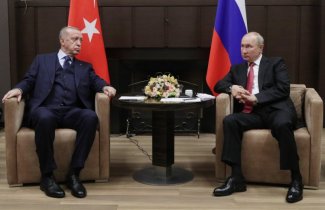Erdoğan-Putin summit in Sochi

The first meeting between the presidents of Turkey and Russia after a year and a half took place in Sochi on 29 September. The talks between Recep Tayyip Erdoğan and Vladimir Putin were closed to the media and lasted almost three hours. The main topic was to be the issue of Turkish-Russian relations in Syria. The leaders did not issue statements after the meeting. In a Turkish news agency release, Erdoğan only assessed the talks as "useful and comprehensive".
Commentary
- Since the previous meeting between the two presidents in Moscow in March 2020 (during which a ceasefire in Idlib was agreed following the bloody escalation of the Turkish-Syrian conflict), Turkey's relations with Russia have remained severely strained. Reasons for this include Ankara's cooperation with Ukraine (especially in the military sphere), Turkey’s refusal to recognise the annexation of Crimea, and the strategic challenge Turkey has posed to the Russian Federation in the South Caucasus (the Nagorno-Karabakh war in 2020 and its consequences). The day before the meeting, tensions in Idlib province and Afrin escalated further, with Syrian troops and the Russian Air Force carrying out a series of attacks on anti-Assad armed opposition positions in the region. In response, Turkey strengthened its forces in Idlib with another contingent of several thousand troops. The intensification of the conflict was most likely due to Moscow's tactics – using Syrian force in an attempt to force Erdoğan to change direction in Syrian and regional politics.
- The lack of specific information indicates that the talks have failed to produce a breakthrough. The main area of contention is the situation in Idlib. Moscow is showing increasing irritation, accusing Turkey of ineffectiveness in neutralising terrorist organisations and anti-Assad opposition in the province. The real reason for this irritation, however, is Russia’s dissatisfaction with the sheer fact that territory not controlled by Bashar al-Assad exists and with Ankara's reluctance to recognise his regime. Turkey, in turn, fears a potential exodus of at least 900,000 refugees into the country triggered by the Russian-backed Syrian army. For Ankara, the military presence of the Turkish armed forces in Idlib is a guarantee against the emergence of Kurdish autonomy under the aegis of the terrorist offshoot of the Syrian PKK. For this reason, Erdoğan perceives Putin's growing pressure to hand over the region to Assad as a threat to Turkey's national security. The clash of interests between Ankara and Moscow over Idlib will affect their overall relations in other areas.
- Ankara's policy on Syria will focus on keeping Moscow and Damascus out of Idlib; this will increase tensions with Moscow. The effectiveness of Turkey's strategy will be tested by its ability to withstand Moscow and Damascus’s escalation of the conflict in the region. It is to be expected that Erdoğan will seek to further counter the pressure of the Russian Federation by activating Ankara's global policy. An example of this is his recently announced meeting with Joe Biden at the upcoming G20 summit. Turkey hopes that the Russian government will interpret this signal as Turkey strengthening its position by appealing to its NATO allies.
- Bearing in mind the Kremlin's strategy towards Turkey (aimed at eroding its ties with the West and its alliance with the United States), and judging by the current state of its relations with Ankara it may be concluded that Moscow is prepared to accept – to a certain extent – Turkish geopolitical aspirations even where they collide with its own interests. Russia is seeking to curb Turkish ambitions, but is avoiding a frontal confrontation so as not to pushAnkara towards a return to close cooperation with the USA. In this context, it is also important for Russia to develop economic ties which create a mechanism of economic interdependence between the states, reinforcing the process of separating Turkey from the Western structures. All these factors contribute to Russia's need to mask contradictions with Ankara and emphasise the positive sides of bilateral relations.





